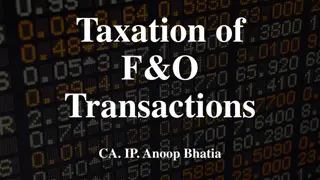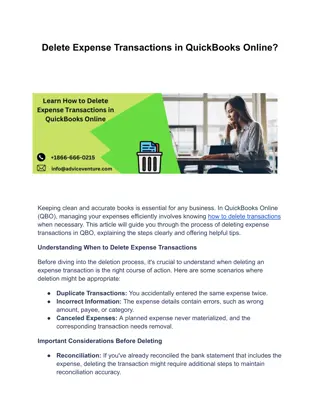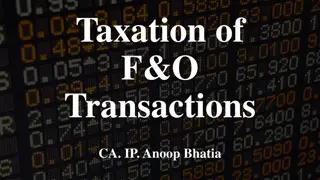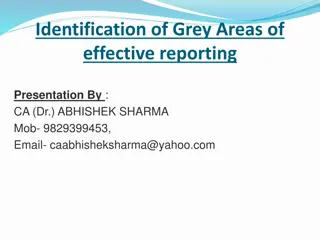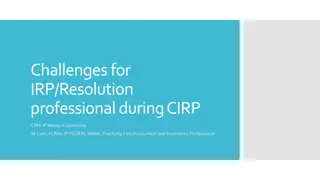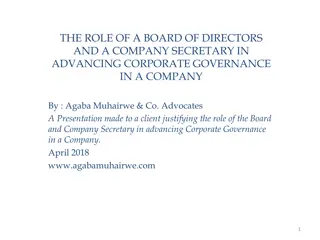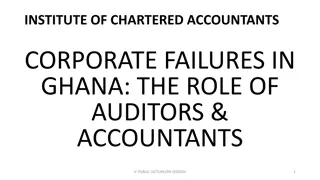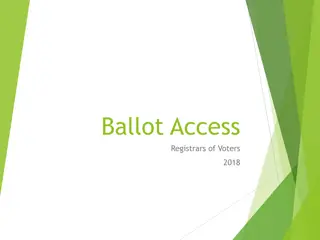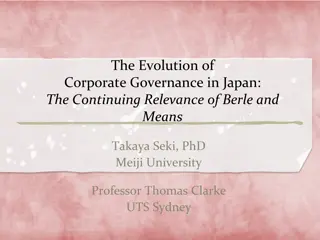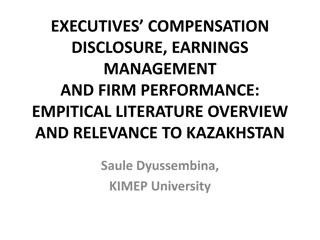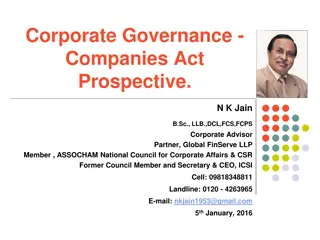Understanding Related Party Transactions in Corporate Governance
Related Party Transactions (RPT) are vital in today's business world, ensuring transparency and disclosure in transactions involving parties related to the company. This article explores the significance of RPT, definitions under CA 2013 and SEBI LODR 2015, as well as the identification criteria as per AS-18. It emphasizes the need for disclosure to provide stakeholders with a clear understanding of an entity's financial dealings with related parties.
Download Presentation

Please find below an Image/Link to download the presentation.
The content on the website is provided AS IS for your information and personal use only. It may not be sold, licensed, or shared on other websites without obtaining consent from the author. Download presentation by click this link. If you encounter any issues during the download, it is possible that the publisher has removed the file from their server.
E N D
Presentation Transcript
Presented by:- CS Murli Manohar Purohit Vice President Company Secretary & Compliance officer Reliance Power Limited
Why Related Party Transactions ?? RPT are integral part of business in today s world. The transactions between Related Parties are generally conducted at negotiated terms hence, RPT must be disclosed. Additionally, for an investor knowledge of RPT facilitates more informed decision to invest. For others also RPT disclosure presents a correct picture of risks and opportunities of the entity.
Companies Act, 2013 RPT SEBI (LODR) Regulations, 2015 AS/IND-AS
Related Party under CA, 2013 Definition :- Section 2(76): Related party with reference to a company means: i. a director or his relative; ii. a KMP or his relative; iii. a firm, in which a director, manager or his relative is a partner; iv. a private company in which a director or manager or his relative is a member or director; v. a public company in which a director or manager is a director and holds along with his relatives, more than 2% of its paid-up share capital; vi. any body corporate whose Board of Directors, managing director or manager is accustomed to act in accordance with the advice, directions or instructions of a director or manager; vii. any person on whose advice, directions or instructions a director or manager is accustomed to act:
viii. any body corporate which is (A) a holding, subsidiary or an associate company of such company; (B) a subsidiary of a holding company to which it is also a subsidiary; or (C) an investing company or the venturer of the company; ix. a director other than an independent director or key managerial personnel of the holding company or his relative with reference to a company, shall be deemed to be a related party.
Related Party under SEBILODR, 2015 Related party defined under Section 2(76) of the CA, 2013 Related Party Reg. 2(1)(zb) Applicable accounting standards (AS 18 /IND- AS 24) Any person or entity belonging to the promoter or promoter group of the listed entity and holding 20% or more of shareholding in the listed entity
Related Party as per AS-18 - Parties are considered to be related if at any time during the reporting period one party has the ability to control the other party or exercise significant influence over the other party in making financial and/or operating decisions. - Control has been defined in Para 10 ofAS-18 - Ownership of more than 50% of the Voting Power - Control of composition of Board of Directors / Governing Body -a substantial interest in voting power and a power to direct, by statute or agreement, the financial and/or operating policies of the enterprise. - As per clause 10.4 of AS 18 Significant Influence means participation in the financial and/or operating policy decisions of an enterprise, but not control of those policies. - Significant Influence can be exercised in several ways. It may be gained by share ownership, statute or agreement. Significant influence through Share ownership can be manifested by the investing party holding, directly or indirectly through intermediaries, 20% or more of the voting power.
Related Party under IND-AS 24 :- [Clause 9(a)] A person or a close member of that person s family is related to a reporting entity if that person: (i)has control or joint control of the reporting entity; or (ii)has significant influence over the reporting entity; or (iii)is a member of the KMP of the reporting entity or of a parent of the reporting entity.
Control is the power to govern the financial and operating policies of an entity so as to obtain benefits from its activities. Joint control is the contractually agreed sharing of control over an economic activity Significant influence is the power to participate in the financial and operating policy decisions of an entity, but is not control over those policies. Significant influence may be gained by share ownership, statute or agreement.
[Clause 9(b)] says thatan entity is related to a reporting entity if any of the following conditions applies REPORTING ENTITY A person identified in (a)(i) has significant influence over the entity or is a member of the key management personnel of the entity (or of a parent of the entity). One entityis an associate or joint venture of the other entity (or an associate or joint venture of a member of a group of which the other entity is a member) The entity is a post- employment benefit plan for the benefit of employees of either the reporting entity or an entity related to the reporting entity The entity is controlled or jointly controlled by a person who has control or joint control of the reporting entity Entity and reporting entity are members of same Group (Same Group = Parent, Subsidiary& Fellow Subsidiary [cl 9(b)(i)] One entity is a joint venture of a third entity and theother entity is an associate of the third entity Both entities are joint ventures of the same third party [cl 9(b)(iii)] [cl 9(b)(iv)] [cl 9(b)(vi)] [cl 9(b)(v)] [cl 9(b)(viii)] [cl 9(b)(ii)] [cl 9(b)(vii)]
RELATED PARTY RELATIONSHIP [clause 9(b)(i)] Entity and Reporting Entity are members of same Group (Same Group = Parent, Subsidiary & Fellow Subsidiary HOLDING COMP ANY Reporting Entity SUBSIDIARY FELLOW SUBSIDIARY
RELATED PARTY RELATIONSHIP (clause 9(b)(ii) One entity is an associate or joint venture of the other entity (or an associate or joint venture of a member of a group of which the other entity is a member) HOLDING COMP ANY Reporting Entity SUBSIDIARY ASSOCIATE or JV ASSOCIATE or JV FELLOW SUBSIDIARY
RELATED PARTY RELATIONSHIP [clause 9(b)(iii) & (iv)] Both entities are joint ventures of the same third party One entity is a joint venture of a third entity and the other entity is an associate of the third entity JV AX JV AX THIRD COMP ANY ALTD THIRD COMP ANY ALTD JV A Y ASSOCIATE
RELATED PARTY RELATIONSHIP [clause 9(b)(vi)] The entity is controlled or jointly controlled by a person who has control or joint control of the reporting entity Person A ALTD B PVT LTD REPORTING ENTITY
RELATED PARTY RELATIONSHIP (clause 9(b)(vii) A person identified in (a)(i) has significant influence over the entity or is a member of the key management personnel of the entity (or of a parent of the entity). SIGNIFICANT INFLUENCE Person A ALTD B PVT LTD CONTRO L X LTD (HOLDING CO) REPORTING ENTITY
What are Related Party Transactions? SECTION 188 OF COMPANIES ACT , 2013 REGULATION 2(ZC) OF LODR ACCOUNTING STANDARD 18 IND-AS 24
The Companies Act, 2013 does not define the expression Related Party Transactions . Section 188 refers the expression contract or arrangement to related party transactions. As per AS-18 Related Party Transactions are defined as a transfer of resources or obligations between related parties, regardless of whether or not price is charged. As per IND AS -24 A related party transaction is a transfer of resources, services or obligations between a reporting entity and a related party, regardless of whether a price is charged.
Related Party Transactions (RPTs) :- R P T s under Companies Act, 2013 R P T s u/s 188 Other R P T s (Pursua nt to section 188and approval of ACM under section 177) (Pursua nt to respective section and approval of ACM under section 177)
Related Party Transactions (Section 188) Except with the consent of the Board of Directors given by a resolution at a meeting of the Board, no company shall enter into any contract or arrangement with a related party with respect to Related Party Transactions RELATED PARTY as defined in Section 2(76) RELATED PARTY TRANSACTIONS Sale, purchase or supply or any goods or materials Selling , buying property of any kind Leasing of property of any kind Availing or rendering of any services Appointment of agent for purchase or sale of goods, materials, services or property Appointment to any office or place of profit in the company/Associate /Subsidiary Underwriting of securities Prior approval by members required if: Value of transaction during a FY exceeding specified sum Related Party not entitled to vote on Members Resolution If 90% of members are either related parties or relatives of Promoters, RPs can vote on Resolution. Section not to apply to transactions entered in ordinary course of business and are on Arm s length basis.
Two conditions have to be satisfied to avail of the exemptions from the provisions of Related party u/s 188 by a Company in respect of any transaction with a related party : 1. It must be entered into by the Company in the ordinary course of its business; 2. It must be an arm s length transaction.
Arms Length Price conducted as if they were unrelated a transaction between two related parties no conflict of interest. Arm s Length Price
Approval Procedure under Companies Act, 2013 A company shall not enter into a contract or arrangement with any related party except with the prior approval of company by Ordinary Resolution (Rule 15(3) ofCompanies (MBP) Rules, 2014) APPROVAL PROCEDURE FOR Approval of Audit Committee of transactions with related parties or their subsequent modifications. sale, purchase or supply of any goods or materials directly or through appointment of agents 10% or more of Turnover of the company Committee may grant Omnibus approvals for RPTs as per Rules. selling or otherwise disposing of, or buying, property of any kind directly or through appointment of agents 10% or more of Networth of the company. All RPTs u/s 188 require approval by Board of Directors of Company. the leasing of property of any kind 10% or more of turnover of the company All specified approval of shareholders by way of Ordinary Resolution. transaction(s) value exceeding require prior availing or rendering of any services directly or through appointment of agents 10% or more of turnover of the company appointment to any office or place of profit in the company, its subsidiary company or associate company at a monthly exceeding two and half lakh rupees remuneration No necessary for transactions entered into between a HC and its WOS whose accounts are consolidated with such holding company and placed before the shareholders at the general meeting for approval shareholders approval remuneration subscription derivatives thereof of the company for of underwriting any securities the or exceeding one percent. of the net worth Turnover or Net Worth shall be on the basis of the Audited Financial Statement of the preceding Financial year. (Expn 1)
RPT s under SEBI(LODR), 2015 Regulation 2(1)(zc): Related Party Transactions means A transfer of resources, services; or obligations between a listed entity and a related party, regardless of whether a price is charged and a "transaction" with a related party shall be construed to include a single transaction or a group of transactions in a contract
Material R P T s under SEBI LODR, 2015 A transaction involving payments with respect to brand usage /royalty exceed 5% of the annual consolidated turnover of the listed entity. (Previous and proposed transactions during FY) A transaction with a related party exceeds 10% of the annual consolidated turnoverof the listed entity. (Previous and proposed transactions during FY) Material RPT s under LODR (Reg. 23)
Compliance under SEBI (LODR), 2015 COMPLIANCE REQUIREMENT APPROVING AUTHORITY AUDIT COMMITTTEE REGN NO 23(2) All related party transactions shall require prior approval of the Audit Committee. 23(3) Audit committee may grant omnibus approval for related party transactions proposed to be entered into by the listed entity subject to the following Conditions :- shall lay down the criteria for granting the omnibus approval in line with the policy on RPTs of the listed entity and such approval shall be applicable in respect of transactions which are repetitive in nature. satisfy itself regarding the need for such omnibus approval and that such approval is in the interest of the listed entity; All material related party transactions shall require approval of the shareholders All entities falling under the definition of related parties shall not vote to approve the relevant transaction irrespective of whether the entity is a party to the particular transaction or not. Transactions entered into between two government companies; Transactions entered into between a holding company and its wholly owned subsidiary whose accounts are consolidated with such holding company and placed before the shareholders at the general meeting for approval. SHAREHOLDERS 23(4) 23(7) EXEMPTIONS 23(5)
Disclosure/Reporting Requirements under Companies Act PROVISION REQUIREMENT 188(2) Every contract or arrangement entered into under sub-section (1) shall be referred to in the Board s report to the shareholders along with the justification for entering into such contract or arrangement. Financial Statements to Comply with Accounting Standards - Disclosure of Related Party Transactions in Financial Statements of a company to be made as per Applicable Accounting Standard 129 134(3)(h) Board s Report to include Particulars of Contracts or Arrangements with Related Parties referred to in Sec 188(1) in AOC-2 RULE 15(2) Where any Director is interested in any contract with Related Party, such director shall not be present at meeting during discussion
Other Disclosures under Companies Act Agenda of Board Meeting (Rule 15(1)) Explanatory Statement of GM (Expln 3 to Rule 15(3)) Name of the Related Party and nature of relationship Name of the relatedparty Nature, duration of the contract and particulars of the contract or arrangement Name of the Director/KMP who isrelated Material terms of the contract including the value Nature of relationship Nature, material terms, monetary value and particulars of contract Any advance paid or received for the contract The manner of determining the pricing and other commercial terms, both included as part of contract and not considered as part of the contract; Any otherr information relevant or important for members to take a decision Whether all factors relevant to the contract have been considered, if not, the details of factors not considered with the rationale for not considering those factors; Any other information relevant or important for the Board to take a decision on proposed transaction
Disclosure/Reporting Requirements under SEBI (LODR), 2015 REGULATION REQUIREMENT The listed entity shall submit within 30 days from the date of publication of its standalone and consolidated financial results for the half year, disclosures of related party transactions on a consolidated basis, in the format specified in the relevant accounting standards for annual results to the stock exchanges and publish the same on its website. Annual report shall contain RPT disclosures as specified in Para A of ScheduleV of these regulations 23(9) 34(3)read with SCH V 46(2)(g) Listed Entity to disseminate on its Website Policy on dealing with RPTs. Report on Corporate Governance shall disclose disclosures on materially significant related party transactions that may have potential conflict with the interests of listed entity at large SCH V para C Disclosure 10 (a) SCH V para C Disclosure 10 (f) Report on Corporate Governance shall disclose web link where policy on dealing with related party transactions is disclosed.













